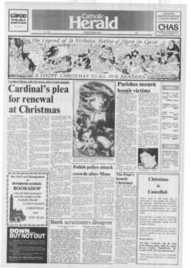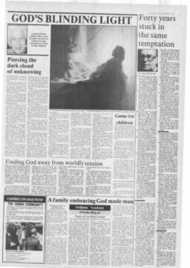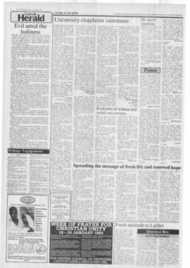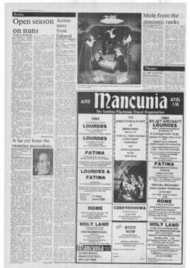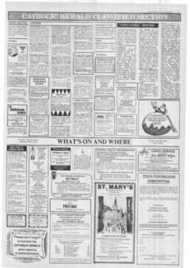Page 8, 23rd December 1983
Page 8

Report an error
Noticed an error on this page?If you've noticed an error in this article please click here to report it.
Tags
Share
Related articles
Tangled Web Of White's Misery
A Convent Schoolgirl’s Tale
Paperback Round - Up Start Your Own Religion By Colin...
The Price Extracted By Catholicism
May's Frost Thaws In Autumn's Years
Antonia White: A Life, By Jane Dunn, Jonathan Cape Ian
Open season Action
on nuns
As Once in Max. the Fairly' Autobiography of Antonia White and Other writings, Edited by Susan Chitty (Virago Press £10.95).
EDITING THIS collection of her mother's unpublished work must have tried the patience of Susan Chitty's filial piety.
The facsimile of a page of manuscript printed on the endpapers bears out her description of the papers, to crossed out, over-written and rewritten that often a choice had to be made of which version should be printed.
The principal works are fragments of two novels — "I have a superb collection of beginnings" Antonia White once wrote — and an account of her early childhood.
The introduction sketches a complete biography and explains which character represents which of Antonia's husbands and lovers. Inevitably there is an account of schooldays at Roehampton and the fearful trauma of her disgrace and expulsion, which she used in her best-selling first novel, Frost in May.
Since then of course it has been open season on nuns, and every novelist has a tale of repressive and peculiar tredatmcnt at their convent school, from Edna O'Brien to Clare Boylan.
The oddest nun story I know dates from quiet recent years, when my nieces were obliged to stick a pin into a large red flannel representation of the Sacred Heart if they talked during study.
My own convent school was of the ITIVM brand, and the majority of the nuns were kindly and enlightened, but they understandably drew the line at permitting us to read Frost in May. I remember the frisson of terror with which we smuggled round the illicit copy, muffled in brown paper.
Frost in May is a painful account of misunderstanding and injustice, and it does so well evoke that hopeless condition of childhood, of wanting to be good, longing to do right. but
quite innocently and unconsciously perpetrating an unsespected crime and bringing down nemesis on one's head.
The other major trauma of Antonia White's life was her attack of insanity. I can hardly bear reading Beyond the Glass, the novel which deals with this episode in her life.
Anyway, the early autobiography which composes the second half of this book is pure delight. Although Antonia White was working on it up until her death, at the age of eighty the mind seems to flash baek most clearly to its beginnings, the first astonished sight of stars, and the pinching buttonhook fastening gaiters over fat calves.
Also perhaps the psychoanalysis she once underwent is responsible for the intensity of consciousness in some of these memories.
Certainly she blames her inability ever to learn to skate or ride a bicycle on something which happened to her in her pram. The person in charge kept taking their hands offf the handle and letting it run away before catching it.
"For me it was a most alarming experience and my first awareness of fear, insecurity and what I can almost describe as moral indignation".
At the age of four she was tipped half a sovereign which her father made her give back. "After seventy-two years I have not forgotten that breathless moment of possession and the bitter sense of injustice when the treasure was snatched away . . he had sown the seed not only of as pretty a complex about money as any psychologist could be called on to resolve, but of a conviction that the more passionately I wanted something the more unlikely I was to be allowed to have
Still to be published are her journals and letters, and while we look forward to those, let us hope the BBC will be reminded to repeat that excellent adaptation of the Frost in May series.
Margaret Lucy
blog comments powered by Disqus


